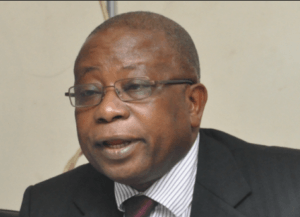Ghana risks not achieving SDG-3 – Health Minister

Mr Kwaku Agyeman-Manu, the Minister of Health, has warned that Ghana risked not achieving the Sustainable Development Goal (SDG) Three, if access to Sexual and Reproductive Health (SRH) Rights of People with Disabilities (PWDs), were overlooked.
Mr Agyeman-Manu, whose address was read on his behalf at a stakeholder’s forum on Improving Universal Access to SHR and Rights of PWDs, called for a conscious effort to target the numerous barriers that confronted these groups of persons in order to achieve Universal Health Coverage (UHC) by 2030.
He also called on Civil Society Organisations and all other health partners to intensify their advocacies for the review of the Disability Act, Act 715 of 2006, to clearly spell out the SRH and Rights for PWDs, and to compel service providers to recognize these groups as the beneficiaries of Rights to the services.
He mentioned that gaps and barriers, such as physical, educational, economical and communication continue to exist, affecting over 50 per cent of PWDs.
He said access to specific health services, including cancer screening and Family Planning were abysmal among this group of people, leading to increased morbidity and preventable deaths.
The forum, which was organised by the Alliance for Reproductive Health Rights (ARHR), in partnership with the French Embassy in Accra, was therefore to set the stage for a national dialogue, to come up with a comprehensive strategic policy guidelines for promoting the sexual Rights of PWDs.
Mr Agyeman-Manu explained that the SDG-3, had specific targets to ensure access to SRH care and UHC, stressing that, “Ghana will not realise its SDG-3 target if SRH needs of PWDs are not adequately addressed through a robust financial mechanism and an effective Primary Health Care System”.
He said such a move would facilitate the increased access covering the delivery of health care for these and other marginalized groups.
He also pointed out that although the country was a signatory to a number of International Conventions on Disability Rights, and had its own internal Constitutional and legal frameworks, as well as the Persons with Disability Act, 2006 Act 715, PWDs continue to be marginalised and abused by society.
Mr Agyeman-Manu said PWDs, continued to experience stigmatization and deprivation of their SRH and Rights, which prevented their effective progress in society and limit their full participation in mainstream activities on equal basis with others.
Studies, he said, had revealed that in Ghana, PWDs, particularly the hearing and visually impaired, as well as the physically challenged, were increasingly vulnerable to abuses such as rape, defilement, sexual harassment and assault, and also lacked access to SRH information services.
They were also often abused by health service providers and institutions of care, who failed to provide them with SRH information to enable them to make informed and independent decisions of their own, he said.
He said the government however recognised the critical role of the health system to achieving national development, hence its vision to ensure that the rights to good health for all Ghanaians would be guaranteed through a systemic health sector with sustainable capacity to deliver affordable, equitable and easily assessable service to all.
The Health Minister said to realise this, the government hoped to expand health promotion locally, scale up disease prevention strategies and improve access to curative and emergency services through vigorous human resource and health infrastructure development, and strengthening of the National Health Insurance Scheme (NHIS).
These strategies would ensure that Primary Health Care (PHC) was available to all citizens, taking into consideration the findings from the Household and Facility Care study.
He also commended the efforts of the ARHRs, the French Embassy and other partners, for organizing the forum, and pledged the Ministry’s readiness to adopt the recommendations.
This would form relevant decision making in the health sector and contribute to the SRH needs of PWDs, and collectively strengthen its collaboration with all stakeholders to improve these needs.”
Ms Vicky Okine, the Executive Director, ARHR, said the forum was to explore effective ways to address the present gaps and remove the various barriers, including cultural, religious, attitudinal and infrastructural obstacles.
A study on stigma-related issues affecting PWDs in accessing SHR, revealed that it was a serious setback towards the interventions being made to improve the health rights and needs of these group.
It called for the strict enforcement of legislation to improve unfriendly facilities such as toilets, and also hospital environment, to aid their movements, ensure privacy and confidentiality of the private information of PWDs in order to boost their confidence in health service delivery.
It also requested for the development of a comprehensive public advocacy and education, improvement in the cost of SRH services to make them affordable to PWDs, and also that such information be made inclusive.
The participants called for the generation of desegregated data on PWD’s to facilitate targeted interventions and services.
Source: GNA
